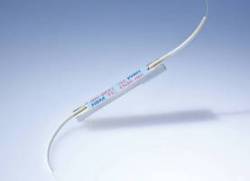Nov 25 2010
HBM has introduced new optical strain gages (SG) that is ideal for experimental stress analysis. The K-OL and the K-OR optical SGs give out electrical signals as the strains are calculated by light. They are utilized in adverse environments when there is a powerful magnetic interference.
The company is also offering the K-OTC sensor for the K-OR and K-OL optical SG. HBM’s K-OTC sensor can be utilized for compensating the optical SGs’ temperature response.
 K-OTC Temperature Sensor
K-OTC Temperature Sensor
The optical SG’s measurement signal is temperature dependent because of the measurement object’s thermal dilation and the fiber Bragg grating’s temperature sensitivity. The measurement signal, depending on the material, can be a maximum of 30 µm/m/K.
However, during stress analyses, the user is interested only in the mechanical strain. Compensating the optical SG’s temperature sensitivity is crucial when the temperature differences are high and the strains are minimal. The K-OTC temperature sensor compensates for the temperature sensitivity in a convenient manner.
The K-OTC is based on optical SG, which is applied to a sensor body made of aluminum. This is connected to the measurement object so that the mechanical strain is not transferred, even when temperature compensation takes place. The K-OTC measures only the fiber Bragg grating’s temperature-dependent signal change and the thermal dilatation of the aluminum.